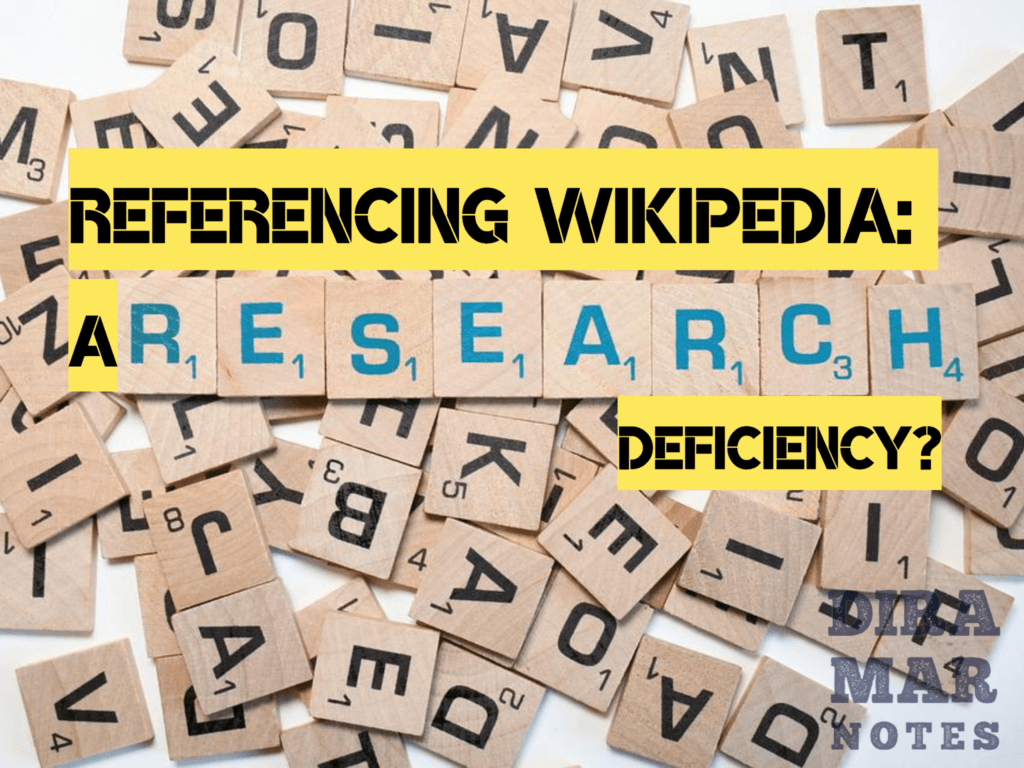
REFERENCING WIKIPEDIA: RESEARCH DEFICIENCY?
Wikipedia’s goal is not to present correct and definitive information about a subject from a direct source but to present the information based on secondary sources that are often opinion-based or lack reliability and accuracy.
I have recently helped a few college students with their final thesis, and I noticed how they use Wikipedia as a reference. It’s one thing to say YouTubers and podcasters use it online when talking about a subject but it’s another thing to see Wikipedia links on the reference list of a college thesis when it’s supposed to be based on “research methodology”. Especially when the referenced links lead to publications that are opinion-based using questionable sources.
INACCURATE AND UNRELIABLE INFORMATION
An academic research methodology has rules for citing electronic sources. More than just citing the information on Wikipedia is not appropriate to use as reliable information. Wikipedia has several problems with its factual reliability, the readability, and organization of the articles, the lack of methodical fact-checking, and its political bias.
One example of how inaccurate the information could be is that imagine you find the description of the services of a company. When you go to the company’s website the information is different because the information was not cited from the primary source, the company’s website, but based on an article that references the services of the company. The article could be from a regular blog, a news platform, or a government website.
Changes can be made to the company’s Wikipedia page, but the review process is complicated and sometimes even information from the direct source is rejected. When it comes to a personality or celebrity page, they should be able to update their information but eventually, that is not the objective of posting information based on secondary sources sometimes mostly based on opinions and rumors.
MEDIA LITERACY EDUCATION
The 2014 edition of the Massachusetts Institute of Technology’s official student handbook, Academic Integrity at MIT, informs students that Wikipedia is not a reliable academic source, stating the following:
“Wikipedia or other wikis, collaborative information sites contributed to by a variety of people, are not considered reliable sources for academic citation, and you should not use them as sources in an academic paper.
The bibliography published at the end of the Wikipedia entry may point you to potential sources. However, do not assume that these sources are reliable – use the same criteria to judge them as you would any other source. Do not consider the Wikipedia bibliography as a replacement for your own research.”

“Articles from online publications and databases often provide an author’s name and credentials so that you can evaluate the author’s reliability as a source.
However, the reality is that anyone can put up a website, create a Facebook page, or post via a multitude of other social media tools. Before you take information from a source you have found on the Internet, assess its reliability by looking for the following:
Name of the author: Is the author a recognized authority? Or is the author a student who has posted his or her paper online? If the person is not a qualified expert, you should not use the information.
Name of the sponsoring institution: Is the sponsoring institution a name that you recognize as a reliable, unbiased source of information? Examples are the World Health Organization, The United Nations, and The American Medical Association. If you cannot locate this information or you are not sure of the reliability of the institution, do not use the information.
Date of posting: Has the website been recently updated? Is the information current? The relevance of the information can be affected by the timeliness of the post. Based on your topic, you need to evaluate if timeliness is critical.
Some electronic sources such as Government, University, institutional or organizational websites, and social media have no clear author. When using sources without a clear author, always look for the name of the sponsoring institution and investigate its reliability. If you cannot locate this information or you are not sure of the reliability of the institution, do not use the information.”
THE ISSUE WITH THE REVIEWS AND THE EDITS
They say that Wikipedia’s online community of volunteers, administrators, and bots ensures edits are based on reliable citations. But what do they define as reliable citations when the “reliable sources” such as CNN are publishing inaccuracies?
The retractions, in some cases when they are published, are not referenced. The initial publication with the inaccurate information remains cited as the source. What do they do when the company or person referenced in the page edits the information that is accurate but doesn’t have a secondary source to link it to?
When that happens, the edit gets rejected. There is also the problem of biased positions of the community of reviewers which generates discrimination based on gender, race, religion, and political views. It’s difficult to reference Wikipedia as a helpful tool for spotting fake news when they may have it published on their platform.
FINAL THOUGHTS
Overall, the platform has complicated editing and reviewing process and the reliability of the information published is often questionable by those who practice critical thinking.
Yet it remains the most referenced free online encyclopedia, by common people when they need a quick reference not realizing that the information found may not be fully accurate or reliable.
Unless the platform becomes more transparent with its processes, internal rules, and regulations and becomes more user-friendly it will remain an issue to use Wikipedia for academic research from an objective point of view.
Those thinking critically will be cautious when assessing the information on the platform in order to determine how they will use the information for their purpose.
Sources:
MIT. Academic Integrity at MIT. A Handbook for Students. Last accessed on June 28, 2022:
Update July 31, 2023:
Glen Greenwald. System Update Podcast streamed on July 31, 2023. Wikipedia: From Democratized Knowledge to Left-Establishment Propaganda, w/ co-Founder Larry Sanger.




I agree that it should be more user friendly. Inaccurate information is there indeed. It is also true that people consider it an online encyclopedia and often use it. It’s not only Youtubers and entertainers, it is very much used in schools and business.
At my previous employer which was a small company they tried to update their information but the changes were denied because they were coming from a “primary source”. So they didn’t accept the information directly from the company but from secondary sources. Basically based on “he said she said”. And I have to believe that they review all the “he said she said” aka “gossip” articles? And update corrections of articles and publications?
To this day the small company I mentioned still has the outdated information on its Wikipedia page.
Hi Jane,
Hope you are doing well.
Thanks for sharing your views and your support. Much appreciated 🙂